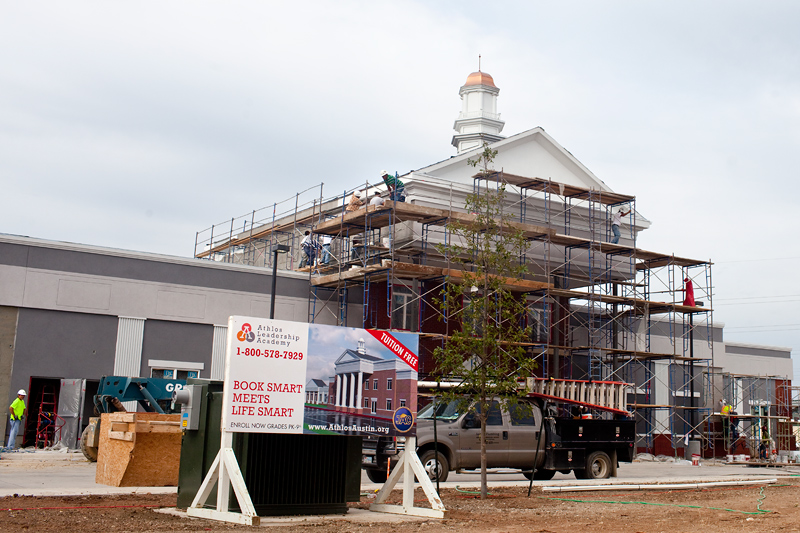
State Board Rejects Charter School Backed by Idaho Real Estate Group

Above: North Austin's Athlos Leadership Academy under construction in August 2014.
Update July 20, 2:19 p.m.:
Late on Friday, Athlos Foundation Board President Tiffany O’Neill said in a statement that the board was “disappointed” by the 12-2 vote to reject its charter application, but that she and the board will keep trying.
During Friday morning’s meeting of the State Board of Education, Dallas Democrat Erika Beltran raised concerns about Athlos’ ambitious growth plans—particularly given that Athlos’ local information session drew just 15 prospective parents—and an out-of-state track record Beltran called concerning. Amarillo Republican Marty Rowley wondered about conflicts of interest in the school’s plan to lease buildings from an Idaho construction firm associated with Athlos Academies.
O’Neill told Beltran that theirs would be the first schools to use the academic curriculum developed by Idaho’s Athlos Academies, so comparisons to test scores at schools in other states would be unfair. To Rowley’s concerns, she said she still planned to solicit bids for the school construction, but simply used the Idaho firm’s contract and estimates as a reference point in the school’s application.
It’s the second year in a row that the state has rejected an application for an Athlos charter school amid concerns about the real estate and governance ties between a Texas-based Athlos Foundation board and the Athlos Academies leadership in Boise.
Update July 17, 11:47 a.m.:
In its meeting Friday morning, the State Board of Education vetoed the Athlos Academy application.
Motion to reject Athlos Academy passes overwhelmingly. #txed #sboe
— Nicole Cobler (@nicolecobler) July 17, 2015
Original Story:
In a parallel universe somewhere, on an obscure cable network’s early-morning programming, there’s a reality show for folks vying to open their own charter schools. In that universe, as in ours, the prospects are a motley bunch of would-be edupreneurs, with “leadership academies” they’ve named after themselves, and side businesses selling vitamin supplements optimized for workplace productivity. And they’ve all got vastly different plans for improving Texas’ school system, a few hundred kids at a time.
On that reality show, a year’s work of filling out elaborate applications, holding public meetings, studying real estate markets and getting grilled by state regulators would all build to a tense final episode—one that would look an awful lot like the State Board of Education’s next couple of days.
Six new charters, which would open in fall 2016, are up for final approval by the state board Friday, based on final recommendations from Education Commissioner Michael Williams. All were tentatively approved this morning by a committee of five board members. Now the prospective schools now face one final hurdle: With a majority vote, the state board can veto any of the commissioner’s picks.
This is the second year under that approval system. Last year the board vetoed one application: a charter for Arizona-based Great Hearts Academies to expand into North Texas. (Williams sidestepped that veto by letting Great Hearts expand under a pre-existing charter for San Antonio.)
There’s probably a limited chance of drama in this year’s picks, but expect some debate from the board over one application in particular, from Athlos Academy. In its interview earlier this year, the Athlos team faced tough questions from board member Ruben Cortez over the school’s ties to out-of-state groups. Its application lists an entirely Texas-based board, but the Athlos brand refers to an Idaho-based charter school and real estate group that licenses the “Athlos” name for its character education program. The Athlos application includes a letter from the team in Idaho—an Athlos-associated group, The Charter School Fund—promising the school a $80,000 grant, as well as a lease agreement with an unspecified company at The Charter School Fund’s address in Boise.
According to the school’s proposal, between lease payments and licenses for the Athlos character curriculum, the new school would send about 20 percent of its state funding to Idaho.
Cortez told the Observer that his main concern with the Athlos application is its out-of-state roots. “I’ll take a position against any out-of-state entities wanting to come up and set up a charter in Texas,” he said. “I’m just gonna bring up my concerns, and obviously every member has a right to vote how they decide.”
According to the school’s proposal, between lease payments and licenses for the Athlos character curriculum, the new school would send about 20 percent of its state funding to Idaho.
As the Observer reported last year, the Idaho-based Athlos crew has been making inroads in Texas by constructing stately new school buildings and leasing them to pre-existing charters, some of which also take on the Athlos name or the character curriculum. Twice before, a group using the Athlos name has applied for its own charter from Texas and come up short; barring a surprise at this week’s meetings, they’ll finally be in luck.
Athlos plans to open two schools in the Dallas suburbs (its application originally proposed six), with a learning environment built on a model balancing academics with athletics and character development.
Other applicants up for final approval include Houston’s A+ Unlimited Potential, tied to the well-established education nonprofit Houston A+ Challenge and based on a classroom model they’ve piloted in the last few years. The rest of the schools, including Athlos, are scattered around the Dallas-Fort Worth suburbs: Lone Star Language Academy in Plano, which would be the state’s only K-8 public school with a Hebrew language program; Trivium Academy in Frisco, which promises a “progressive take on a classical education”; Pioneer Technology and Arts Academy, which plans five middle- and high-school campuses around the Metroplex; and Kauffman Leadership Academy in Cleburne, headed by Dr. Theresa Kauffman who first applied for a charter in 2011. Kauffman Leadership Academy proposes an individualized learning environment with an anti-bullying focus—its application refers specifically to a series of child suicides with possible connections to bullying in Cleburne’s public schools.
More notable than the particulars of this year’s finalists may be the fact that there are so few of them—just six approvals out of 32 applications. Lawmakers sold the 2013 overhaul of Texas’ charter school system as a vast expansion. Lt. Gov. Dan Patrick, then a senator, heralded Senate Bill 2 as an opening for 100,000 Texas families on charter school waiting lists—a statistic that’s still used today as evidence of the unquenched thirst for school choice.
Instead, the law has closed low-scoring charter schools at an unprecedented rate while new applications have been flat.
David Dunn, executive director of the Texas Charter Schools Association, says he’s glad to see so many community-based charters opening in Texas, but he hopes the state will do more to extend the popular sales pitch “Texas is open for business” to top charter school organizations in other states.
“I think some from out of state see some of the closures and things like that, and are looking to see the effects of that settle out. As the closure effects of Senate Bill 2 start to stabilize, I think we’ll start to see more interest from others as well,” Dunn told the Observer.
SBOE Vice-chairman Thomas Ratliff, a Mount Pleasant Republican, said he’s in no hurry to see the state award charters at a faster clip. (Ratliff said he’ll vote this week along with members whose districts include the proposed charters.)
Ratliff sees the low number of approvals from Commissioner Williams as a sign that state regulators have been vetting applicants more rigorously.
“If it were a high number that would make you worry,” Ratliff says. “The small number gives me reason to believe that they’re sharpening their pencil a little bit on these, and that’s good because it’s hard to close them once they’re open.”


